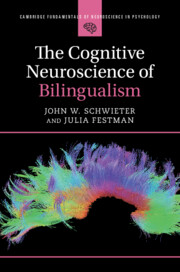Book contents
- The Cognitive Neuroscience of Bilingualism
- Cambridge Fundamentals of Neuroscience in Psychology
- The Cognitive Neuroscience of Bilingualism
- Copyright page
- Contents
- Figures
- Tables
- Acknowledgments
- Chapter One Theories and Methods in the Cognitive Neuroscience of Bilingualism
- Chapter Two Neural Representations and Language Processing in the Bilingual Brain
- Chapter Three Bilingualism, Language Development, and Brain Plasticity
- Chapter Four Aphasia and the Bilingual Brain
- Chapter Five Cross-Linguistic Effects of Bilingualism
- Chapter Six Bilingual Lexical and Conceptual Memory
- Chapter Seven Cognitive and Neurocognitive Effects of Bilingualism
- Chapter Eight Conclusion
- References
- Index
- References
Chapter Six - Bilingual Lexical and Conceptual Memory
Published online by Cambridge University Press: 01 October 2023
- The Cognitive Neuroscience of Bilingualism
- Cambridge Fundamentals of Neuroscience in Psychology
- The Cognitive Neuroscience of Bilingualism
- Copyright page
- Contents
- Figures
- Tables
- Acknowledgments
- Chapter One Theories and Methods in the Cognitive Neuroscience of Bilingualism
- Chapter Two Neural Representations and Language Processing in the Bilingual Brain
- Chapter Three Bilingualism, Language Development, and Brain Plasticity
- Chapter Four Aphasia and the Bilingual Brain
- Chapter Five Cross-Linguistic Effects of Bilingualism
- Chapter Six Bilingual Lexical and Conceptual Memory
- Chapter Seven Cognitive and Neurocognitive Effects of Bilingualism
- Chapter Eight Conclusion
- References
- Index
- References
Summary
Because the majority of the world’s population speaks more than one language, in this chapter we consider that a “bilingual mental lexicon” can be viewed as the default, which may be a more accurate way of exploring lexical and conceptual memory. We transition to examine how concepts and words are represented in the mind, with a particular emphasis on the dynamic, developmental nature of word-to-concept mapping and the distributed, overlapping characteristics of semantic representations. Against this background, we review several theoretical models of word processing – including word recognition, production, and translation. The first set of models includes the Word Association Model and the Concept Mediation Model. We then discuss another set of models that offer a more detailed account of the conceptual system by emphasizing the degree of overlap that exists between conceptual representations in the two languages. In the last section of the chapter, we review two localist-connectionist models: the BIA/BIA+/BIA-d and the Multilink Models.
Keywords
Information
- Type
- Chapter
- Information
- The Cognitive Neuroscience of Bilingualism , pp. 126 - 150Publisher: Cambridge University PressPrint publication year: 2023
